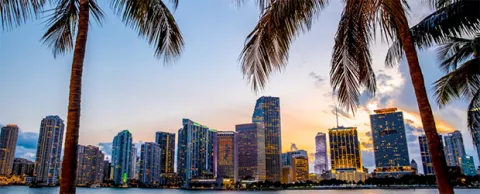
Smart Cities Readiness Challenge Grant winner Miami has been going through a long-term construction boom. And that boom has led to increasing demand for city services from its growing population. Meeting citizen expectations is a big enough challenge on its own. But Miami also has been subjected to increasingly frequent tidal flooding.
Not all coastal cities have the same problem, but several do. Considering that roughly 40% of Americans live in coastal cities and communities, climate change-related sea level change, storm surges and floods affect a large number of people and the economies of the areas they live in. Miami is undertaking a pilot program that will employ a variety of technologies and initiatives to develop a regional resilience strategy. The program is outlined in the story below. If your city is up against similar challenges, Miami's approach may guide you to solutions you can adapt to meet your needs. — Doug Peeples
Major flooding is, of course, disastrous. Even less severe "nuisance" flooding causes problems when water covers roads and blocks traffic, soaks basements and causes other property damage and inconvenience.
Real solutions for real problems
For cities like Miami, flooding has become a serious issue and the city is planning a Sea Level Rise Pilot Program in addition to steps it has already taken. The region has seawalls to help protect low-lying areas and has been working to make them taller in high-risk locations. The city's pilot program, a collaboration with the Environmental Systems Research Institute (ESRI), is a high tech approach that will integrate geographic information systems, 3-D modeling, waterfront sensors and LIDAR (light detection and ranging data to give the city insights into its most vulnerable areas and provide timely flooding alerts.
"We're deeply committed to strengthening innovation and resilience at the city of Miami," said Chief Innovation Officer Mike Sarasti. " This work alongside the Smart Cities Council will help us foster openness and the community collaboration needed to achieve smarter solutions."
The city also has an overall plan to enhance citizen engagement and delivery of services and to ensure its attractiveness as a global destination for business, culture and leisure . The areas identified as priorities in its Strategic Plan include:
- Public safety
- Clean and beautiful neighborhoods
- Growth and development
- Education and economic access
- Culture and recreation
- Efficient and effective government
Learn more from Miami and other city leaders...
Smart Cities Week Silicon Valley will bring together city leaders and technology innovators to explore trends and disruptive technologies for smart cities. The conference kicks off on Monday, May 8 with in-depth pre-conference workshops on crucial topics such as resilience and readiness. Click to learn more and register.
Doug Peeples is a Portland, Oregon-based writer specializing in technology and energy. Follow @smartccouncil on Twitter.



